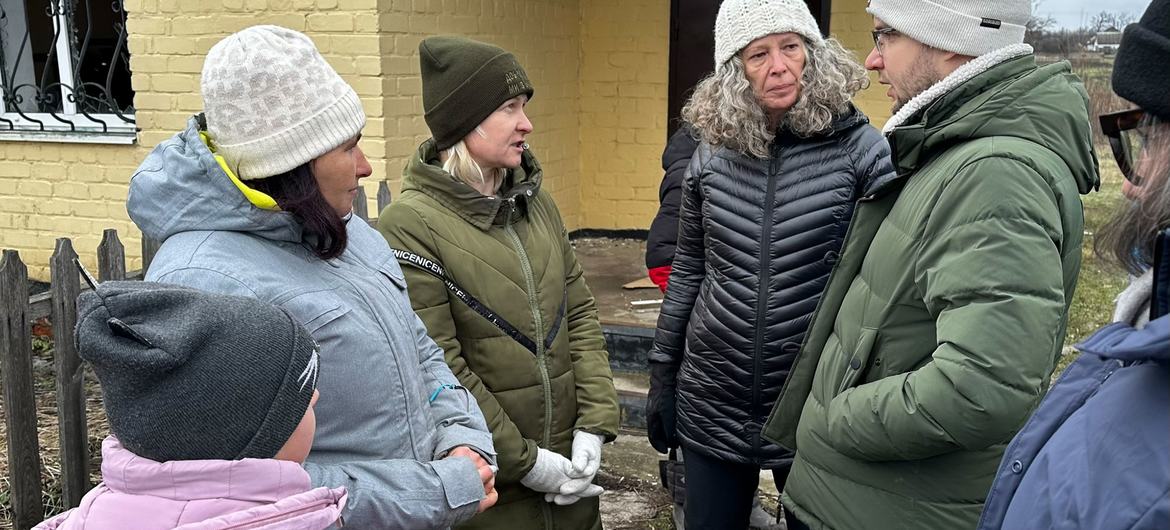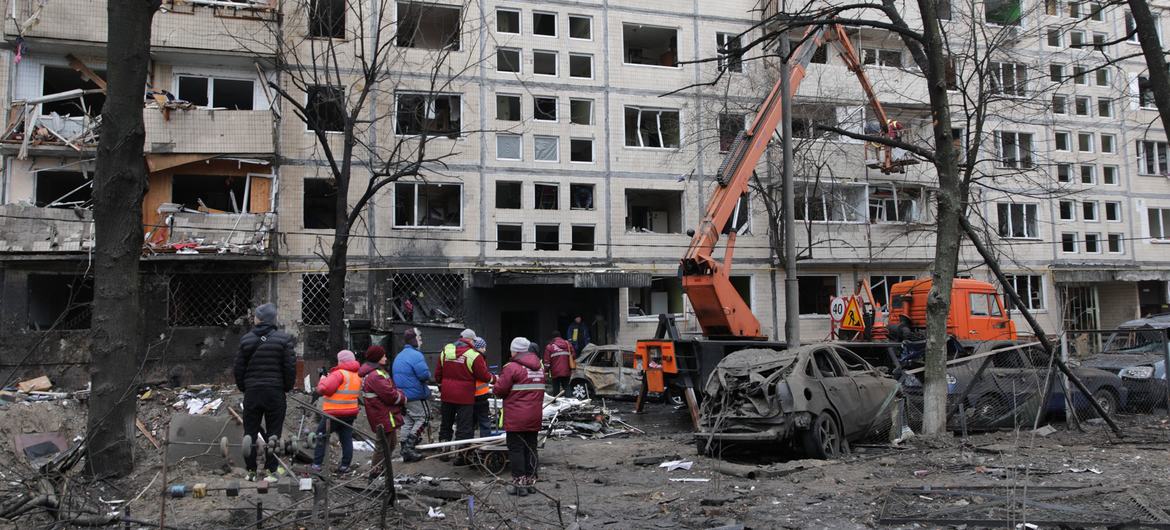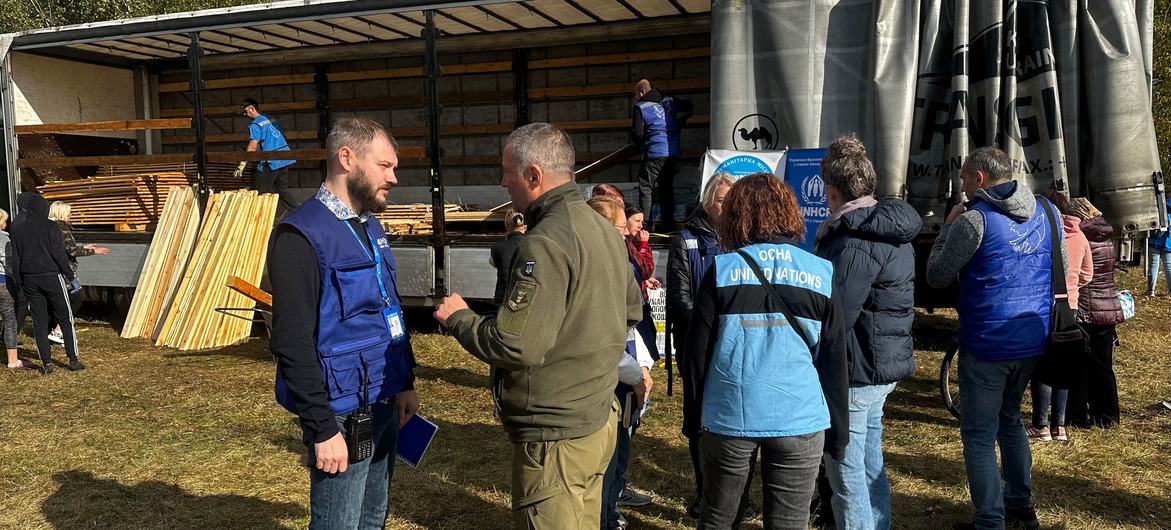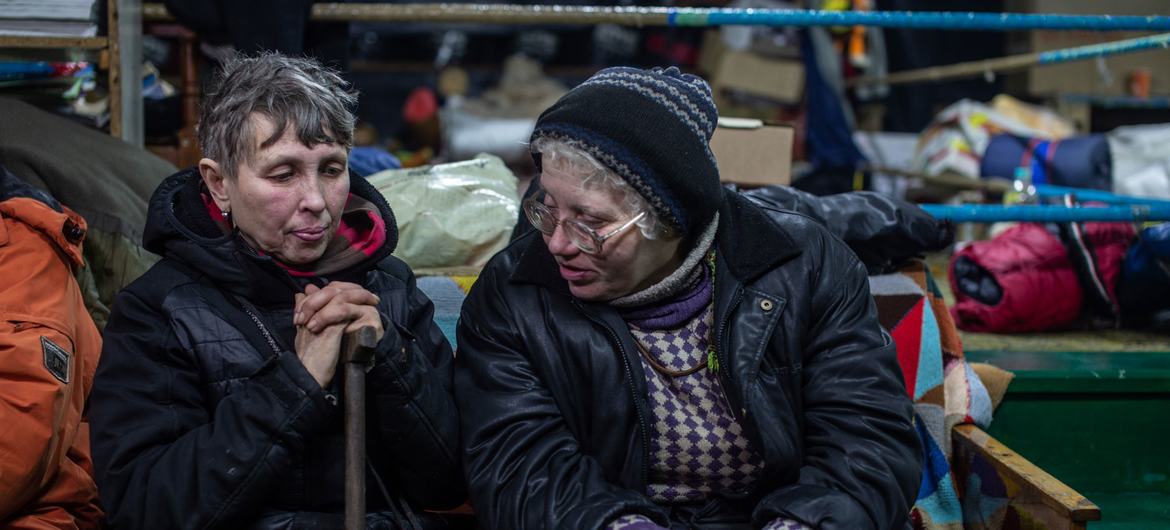INTERVIEW: Suffering and poverty ‘deepen’ through Ukrainian winter

The suffering of people in Ukraine is likely to deepen and they will fall into more poverty through the winter as they continue to endure an almost two-year-old Russian invasion, according to the UN Resident and Humanitarian Coordinator in the country, Denise Brown.
United Nations agencies have continued to provide aid to Ukrainians in a war which has left at least 10,000 civilians dead and 3.7 million displaced in the country and 5.9 million abroad, as of November.
Ms. Brown spoke to UN News as she visited Kupiansk, a small town on the front line in the east of Ukraine, on Christmas Day, as part of an aid delivery convoy.

She started with describing the scene.
This interview has been edited for clarity and brevity.
Denise Brown: We are working during Christmas because the war does not stop; we can still hear shelling in the background. It does not matter what day of the year it is, people in these communities need support. I think it is particularly important on this day to show solidarity from the international community with the people of Ukraine who are suffering the impact of the war since the Russian invasion in February 2022.
We are delivering winter supplies, it is cold. We have brought clothes, mattresses, blankets, solar lamps, essential supplies that we deliver to frontline communities in Ukraine so that people can stay in their homes during these very difficult winter months.

UN News: You have travelled a lot to visit communities in Ukraine. What challenges do people face?
Denise Brown: People in frontline communities are determined to stay at home and to carry on their life with their families as best they can. Sometimes there is no electricity, gas, or water, so they need support in order to manage. We put in place a system well over a year ago, to deliver in one go what people need on the frontline.
This is essential for the wellbeing of people impacted by this horrendous war.
UN News: How traumatized are people?
Denise Brown: It is hard to gauge the trauma, but we hear it in the voices of the people we talk to and see it in the faces of all the elderly and young people. We hear the incessant noise of shelling, of the air sirens. It is very disturbing for all of us.
We are trying to better connect the delivery of supplies with services by connecting to local organizations that can bring the psychosocial support that people need. And we are very grateful to Right to Protection, the Ukrainian Red Cross and Caritas, organizations which provide that psychosocial support, care which is as important as the supplies we are delivering today.
UN News: What are the priorities?
Denise Brown: Our priority is life-saving assistance to communities along the front line. The UN is involved in convoys several times a week which do not only bring supplies, but also moral support, as well as the protection that our presence provides.
Another key priority is helping internally displaced people who had to flee their homes, and ensuring that medical services continue to be provided, including to victims of conflict-related sexual violence or gender-based violence.
All of this is done alongside the national government, regional and local authorities, as well as civil society. I think we have really found the way to work together to successfully provide a package of support to people who are suffering from this war.

UN News: What challenges do you face?
Denise Brown: People have made very difficult decisions to stay in these places and our assistance ensures that they have the minimum and a dignified life no matter where they are.
Delivering aid close to the frontline requires extremely good planning and coordination and we need to ensure that we do not put colleagues at risk.
Where we have absolutely not had success is delivering humanitarian support to the Ukrainians who live on the other side of that frontline. This remains a particularly important issue and we are determined to provide that support.
Crossing the frontline requires guarantees on safety and security from both parties. Unfortunately, we have not yet been able to get that guarantee from the Russian Federation. This is about humanitarian assistance, it is not political. I regret very much that we have not been able to support people.
UN News: How are those people doing?
Denise Brown: We have a good idea of what is going on the other side of the frontline. We know people’s daily lives are being disrupted, that supply chains are affected, and we have good reason to be very worried about the Ukrainians living there.
UN News: Are you receiving enough funding?
Denise Brown: This year we have been able to do our job thanks to the support of Member States and to private sector foundations. Homes, hospitals, and clinics have been destroyed, people have been displaced. If we are able to immediately help that is hugely reassuring to people who find themselves in a conflict that they have nothing to do with.
The war continues in Ukraine, the suffering continues, and therefore the humanitarian response, alongside the government response, remains essential.
The UN does not work alone. So even here today not far away from the front line, all the volunteers came out to help offload and store the essential winter supplies. We do things together; it is that solidarity of the community under very difficult circumstances, coming to work alongside us which is hugely successful. It is a model for other countries.
It is the small things that make a difference. Bakhmut is one of the hotspots of this war close to the frontline, there is no electricity, no running water, no gas. On our second trip there, this wonderful elderly woman who has lived there for 15 years told us she was not leaving.
She was so appreciative of our presence, and I do not know how she did it, but she made us these fantastic apple donuts and insisted that the truck drivers ate them too.
It was such a moment of human kindness in the most extreme of situations, but it is those small moments which make a huge difference to us and the work that we do to support the people of Ukraine

UN News: What role are women playing here?
Denise Brown: Women are on the frontline as volunteers, as mothers looking after their families. I have met women who stayed behind in very difficult contexts, running local clinics so that people there would continue to receive medical support. I have met women mayors and activists.
The backbone of the humanitarian response, I must say, is made up of women, both local and from overseas and somehow, we have found each other and connected to ensure that we do as much as possible together to alleviate the suffering caused by this horrific war.
UN News: Looking ahead to 2024, what support do Ukrainians need?
Denise Brown: The winter continues, it is cold in Ukraine up until the end of March, so this winter response will have to remain in place for the next three to four months.
As long as this war continues, not only does the suffering continue, but it deepens, as does the poverty, and this we need to be prepared for.













Comment List